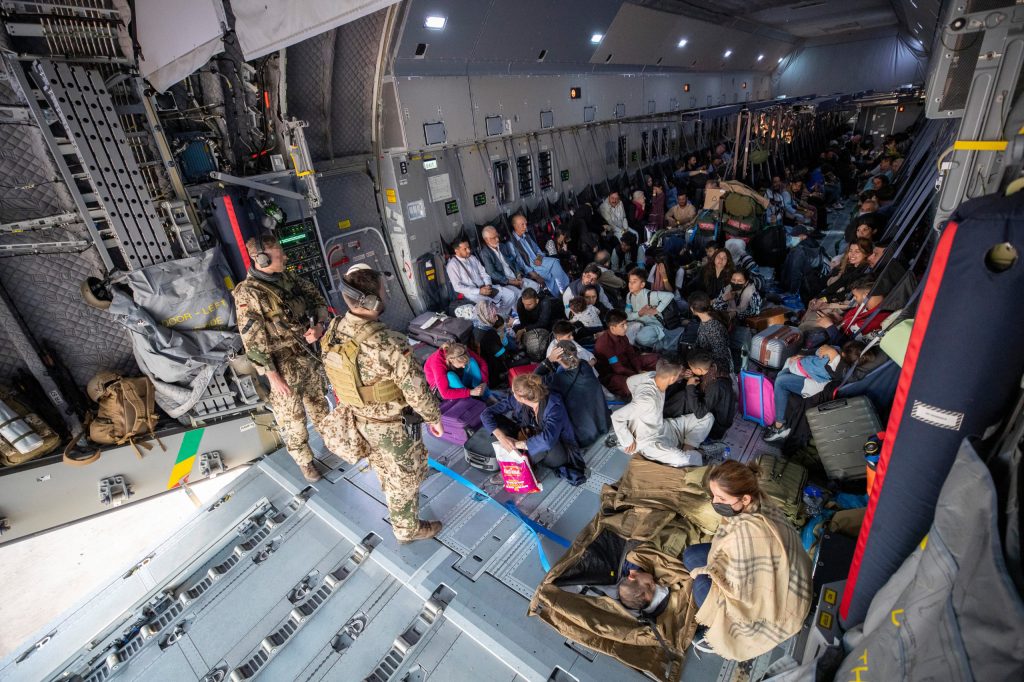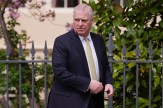Student military vets say US needs to help endangered Afghans

The helter-skelter week in Afghanistan hit close to home for Northeastern students with U.S. military experience. The frenetic unwinding of America’s 20-year presence has spurred a graduate who once worked on navy submarines to advocate on behalf of Afghan refugees. Another, an air force veteran, was left disillusioned with why the U.S. was there in the first place.
“All this money, all of these lives lost, what are we doing there?” Amanda Knowles recalls thinking as she wipes away tears. Knowles flew more than 100 combat missions over Afghanistan during her six years with the U.S. Air Force. She was an engineer working with top secret airborne communications equipment when she decided to pursue a graduate degree at Northeastern in global studies and international relations.
“Part of the reason I separated from the military and chose to pursue higher education was the realization of how inadequate our mission there was in terms of building peace.”
Knowles says she remains “very proud” of her service. Her epiphany was slow in developing at first but began in earnest around 2014 during Afghanistan’s presidential elections when she was flying 20-hour sorties.

Michael Trudeau, left, spent five years in the U.S. Navy before getting an undergraduate degree and an MBA from Northeastern. Amanda Knowles, right, flew on more than 100 combat missions over Afghanistan with the U.S. Air Force. Courtesy Photos
She wasn’t only questioning the reasoning behind the U.S. effort, but was concerned about how the war was playing in the United States. “It really did feel like we were forgotten about and the people of Afghanistan were forgotten about,” she says.
Knowles recalls seeing the now-iconic footage of Afghans clinging to the outside of a hulking U.S. cargo plane as it roared down the runway and wondering how desperate they must be to risk it all like that. That emotion was mixed with joy and pride at the fellow U.S. airmen who were airlifting hundreds of Afghans out

Afghan citizens pack inside a U.S. Air Force C-17 Globemaster III, as they are transported from Hamid Karzai International Airport in Afghanistan, Sunday, Aug. 15, 2021. The Taliban on Sunday swept into Kabul, the Afghan capital, after capturing most of Afghanistan. Capt. Chris Herbert/U.S. Air Force via AP
of the country.
“For me, that should be considered the success of the last 20 years―that we stick to our principles and we’re helping those who helped us.”
Flying in and out of neighboring Qatar, Knowles befriended some of the locals
who worked at her military base.
“They were happy about the mission,” she says. “But the biggest thing that they always talked about is how much they worry for their friends and their families back home.”
Knowles recalls the time an Afghan citizen went to meet his family in Doha and never returned to the base. “We don’t know whatever happened to him,” she says.
After the military, Knowles met a desire to learn more about the world by selling her stuff and traveling to almost 40 countries. During a stop in El Salvador she volunteered with a clean water project and got a kick out of sustainable development.
“I want to be somewhere where I feel like I can have an impact,” she says from the Central American country where she now lives and takes online classes for her Northeastern degree.
An impact is exactly what another student veteran is trying to make in Afghanistan.
Michael Trudeau was a submarine sonar technician deployed in the Western Pacific by the U.S. Navy before coming to Northeastern for an undergraduate degree in political science in 2013 and an MBA in 2018. His new mission is to rescue Afghan citizens who face the Taliban’s wrath for helping America and its allies.
After watching the refugee crisis unfold in Syria, Trudeau got involved with a pair of organizations that assist wartime refugees―Vets for American Ideals and the Association of Wartime Allies.
“As a military veteran, I felt that there was a need to serve again, so I thought that this population in the world definitely needed a voice,” he says.
While refugees were a focus, Trudeau began to realize that there was a large population of at-risk interpreters. Around 2016 he began traveling to Washington to encourage U.S. lawmakers to cut bureaucratic red tape and speed up a visa process that Trudeau says can stretch anywhere from two to five years. Progress has been slow going.
“The visa process is just completely broken,” he says.
The U.S. State Department has approved fewer than 35,000 so-called Special Immigrant Visas for Afghans, a fraction of what is needed to resettle tens of thousands of interpreters, drivers, and many others who supported American and allied forces.
“In the eyes of the Taliban, they’re viewed as traitors,” says Trudeau, “and everybody knows what they do with traitors.” News outlets report beheadings, shootings, and amputations since the militant group took control of the country.
The Afghan Special Immigrant Visa program has been plagued by backlogs for more than a decade, according to the International Rescue Committee, a New York-based humanitarian organization. The IRC says it has resettled more than 16,000 Afghan SIV recipients since the U.S. Congress established the program in 2006.
Trudeau, working in tandem with the refugee organizations, began to curate a list of some 13,000 special immigrant visa applicants from Afghanistan. On that list were the names of not only interpreters but anyone who provided a helping hand to the U.S. embassy, their wives and children included.
“We’ve seen an uptick in violence against these individuals,” he says.
Trudeau gets calls almost hourly from some of them saying, “The Taliban are 20 minutes away, what do I do?” before the line goes dead. “As the days and weeks go on, we lose more and more contact with people outside of Kabul,” Trudeau says.
Over the last four years, he has met with allies on Capitol Hill who are sympathetic to speeding up the visa process for endangered Afghans. A bipartisan group of senators sent a letter dated late last week to U.S. President Joe Biden calling for quick implementation of legislation to reduce bureaucratic hurdles. The letter was signed by 55 senators.
Trudeau’s organization has also submitted a plan to the Biden administration proposing that the United States send Afghans to Guam for processing while their paperwork gets sorted out. “The first thing is just get people out of there because they’re at high risk,” he says.
For media inquiries, please contact media@northeastern.edu.




